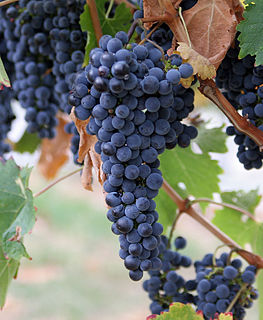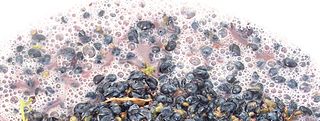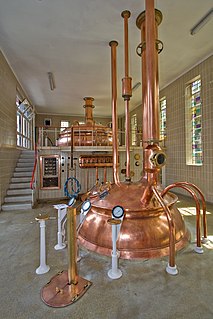Related Research Articles

Winemaking or vinification is the production of wine, starting with the selection of the fruit, its fermentation into alcohol, and the bottling of the finished liquid. The history of wine-making stretches over millennia. The science of wine and winemaking is known as oenology. A winemaker may also be called a vintner. The growing of grapes is viticulture and there are many varieties of grapes.
Merck KGaA, branded and commonly known as Merck, is a German multinational pharmaceutical, chemical and life sciences company headquartered in Darmstadt, with about 56,000 employees and present in 66 countries. Merck was founded in 1668 and is the world's oldest operating chemical and pharmaceutical company, as well as one of the largest pharmaceutical companies in the world.

High-efficiency particulate air (HEPA), also known as high-efficiency particulate absorbing and high-efficiency particulate arrestance, is an efficiency standard of air filter.

Red wine is a type of wine made from dark-colored (black) grape varieties. The actual color of the wine can range from intense violet, typical of young wines, through to brick red for mature wines and brown for older red wines. The juice from most purple grapes is greenish-white, the red color coming from anthocyan pigments present in the skin of the grape; exceptions are the relatively uncommon teinturier varieties, which produce a red-colored juice. Much of the red-wine production process therefore involves extraction of color and flavor components from the grape skin. It is a delicacy around the world.

Borregaard is a Norwegian company, established in 1889 in the southeastern town of Sarpsborg in Østfold county. Its main products were traditionally pulp and paper. The company later started producing chemicals based on timber as a raw material. After a takeover in 1986, Borregaard was part of the chemical division of the Orkla Group until it was spun off and introduced to the Oslo Stock Exchange in October 2012. It has 1050 employees in 2016

Sigma-Aldrich Corporation is an American chemical, life science and biotechnology company owned by Merck KGaA.

De Bortoli Wines is one of the larger privately owned companies in Australia. De Bortoli makes a wide range of wines including the sweet white Noble One.

A syringe filter is a single-use filter cartridge. It is attached to the end of a syringe for use. Syringe filters may have Luer lock fittings, though not universally so. The use of a needle is optional; where desired it may be fitted to the end of the syringe filter.
Bird Machine Company was a company founded in the early 1900s making machines for paper making and then developing into other types of equipment. Bird Machine Company was acquired by Baker Hughes, Incorporated in 1989.

Organic wine is wine made from grapes grown in accordance with principles of organic farming, which typically excludes the use of artificial chemical fertilizers, pesticides, fungicides and herbicides.
Merck Millipore was the brand used for Merck's global life science business until 2015 when the company re-branded. It was originally formed when Merck acquired the Millipore Corporation in 2010. Merck is a supplier to the life science industry. The Millipore Corporation was founded in 1954, and listed among the S&P 500 since the early 1990s, as an international biosciences company, known widely for its micrometer pore-size filters and tests. In 2015, Merck acquired Sigma-Aldrich and merged it with Merck Millipore. In the United States and Canada, the life science business is now known as MilliporeSigma.

The process of fermentation in winemaking turns grape juice into an alcoholic beverage. During fermentation, yeasts transform sugars present in the juice into ethanol and carbon dioxide. In winemaking, the temperature and speed of fermentation are important considerations as well as the levels of oxygen present in the must at the start of the fermentation. The risk of stuck fermentation and the development of several wine faults can also occur during this stage, which can last anywhere from 5 to 14 days for primary fermentation and potentially another 5 to 10 days for a secondary fermentation. Fermentation may be done in stainless steel tanks, which is common with many white wines like Riesling, in an open wooden vat, inside a wine barrel and inside the wine bottle itself as in the production of many sparkling wines.
Spinning cone columns are used in a form of low temperature vacuum steam distillation to gently extract volatile chemicals from liquid foodstuffs while minimising the effect on the taste of the product. For instance, the columns can be used to remove some of the alcohol from wine, 'off' smells from cream, and to capture aroma compounds that would otherwise be lost in coffee processing.

A brewery or brewing company is a business that makes and sells beer. The place at which beer is commercially made is either called a brewery or a beerhouse, where distinct sets of brewing equipment are called plant. The commercial brewing of beer has taken place since at least 2500 BC; in ancient Mesopotamia, brewers derived social sanction and divine protection from the goddess Ninkasi. Brewing was initially a cottage industry, with production taking place at home; by the ninth century monasteries and farms would produce beer on a larger scale, selling the excess; and by the eleventh and twelfth centuries larger, dedicated breweries with eight to ten workers were being built.
This glossary of winemaking terms lists some of terms and definitions involved in making wine, fruit wine, and mead.

In winemaking, clarification and stabilization are the processes by which insoluble matter suspended in the wine is removed before bottling. This matter may include dead yeast cells (lees), bacteria, tartrates, proteins, pectins, various tannins and other phenolic compounds, as well as pieces of grape skin, pulp, stems and gums. Clarification and stabilization may involve fining, filtration, centrifugation, flotation, refrigeration, pasteurization, and/or barrel maturation and racking.
Cellulose fibers are fibers made with ethers or esters of cellulose, which can be obtained from the bark, wood or leaves of plants, or from other plant-based material. In addition to cellulose, the fibers may also contain hemicellulose and lignin, with different percentages of these components altering the mechanical properties of the fibers.
Donaldson Company, Inc. is a vertically integrated filtration company engaged in the production and marketing of air filters used in a variety of industry sectors, including commercial/industrial, aerospace, chemical, alternative energy (windmills) and pharmaceuticals. Also the company's research division, located in Minneapolis, Minn., participated in defense-related projects for various military applications.

The role of yeast in winemaking is the most important element that distinguishes wine from grape juice. In the absence of oxygen, yeast converts the sugars of wine grapes into alcohol and carbon dioxide through the process of fermentation. The more sugars in the grapes, the higher the potential alcohol level of the wine if the yeast are allowed to carry out fermentation to dryness. Sometimes winemakers will stop fermentation early in order to leave some residual sugars and sweetness in the wine such as with dessert wines. This can be achieved by dropping fermentation temperatures to the point where the yeast are inactive, sterile filtering the wine to remove the yeast or fortification with brandy or neutral spirits to kill off the yeast cells. If fermentation is unintentionally stopped, such as when the yeasts become exhausted of available nutrients and the wine has not yet reached dryness, this is considered a stuck fermentation.
CLARCOR Inc. was a manufacturer of filtration systems and packaging materials based in Franklin, Tennessee. founded in Rockford, Illinois as JL Clark Manufacturing Co. by John Lewis Clark in 1904. It had approximately 30 manufacturing and distribution sites in the United States.
References
- 1 2 Gusmer Enterprises. "Gusmer Enterprises Corporate Site" . Retrieved 2012-08-07.
- ↑ Waupaca Now. "Waupaca Plant Plans Expansion" . Retrieved 2012-08-29.[ permanent dead link ]
- ↑ The County Post. "Wapaca's Large Business of the Year". Archived from the original on 2013-02-09. Retrieved 2011-01-26.
- ↑ Fox 11 News. "Waupaca Company Gets Expansion Grant" . Retrieved 2011-04-05.
- ↑ Wine Business Monthly. "Gusmer's Newest Nutrient Product Changes Conventional Wisdom" . Retrieved 2010-07-21.
- ↑ FOSS. "OenoFOSS Analytical Unit" . Retrieved 2012-08-07.
- ↑ BASF. "BASF names Gusmer Enterprises, Inc. as distributor for Divergan PVPP filter aids". Archived from the original on 2013-04-21. Retrieved 2012-08-07.
- ↑ Charles G. Edwards "Illustrated Guide to Microbes and Sediments in Wine, Beer and Juice" Wine Bugs LLC and Gusmer Enterprises 2005 ISBN 0977252205.
- ↑ Unified. "Unified Wine and Grape" . Retrieved 2012-08-07.
- ↑ Master Brewers Association of the Americas. "MBAA Membership". Archived from the original on 2011-08-24. Retrieved 2012-09-15.
- ↑ Monterey County Vintners and Growers. "MCVGA Members". Archived from the original on 2012-08-31. Retrieved 2012-09-10.
- ↑ The Wine Institute. "The Wine Institute" . Retrieved 2012-09-10.
- ↑ Wine Business Monthly. "Claristar Mannoproteins Administratively Approved for Use in Wine by TTB" . Retrieved 2011-11-03.
- ↑ PR Newswire. "FOSS Adds OenoFOSS Service Option with Gusmer Enterprises" . Retrieved 2010-08-02.